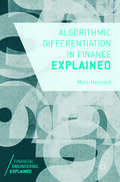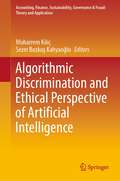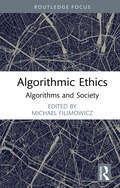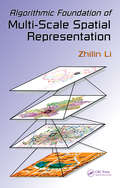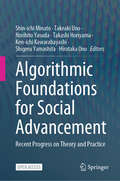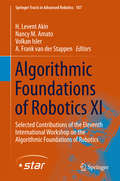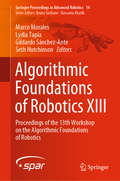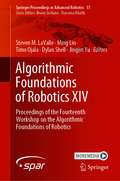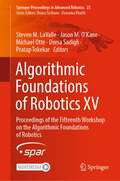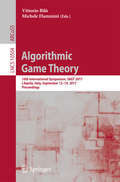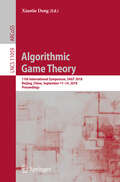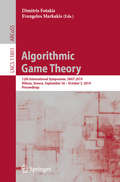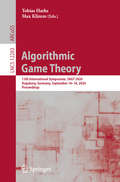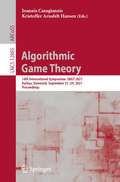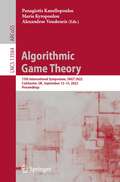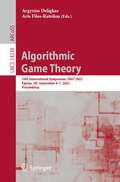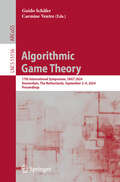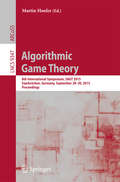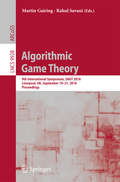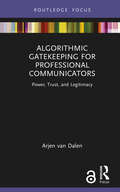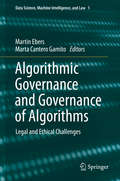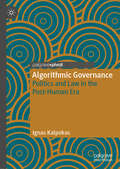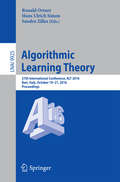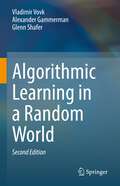- Table View
- List View
Algorithmic Differentiation in Finance Explained (Financial Engineering Explained)
by Marc HenrardThis book provides the first practical guide to the function and implementation of algorithmic differentiation in finance. Written in a highly accessible way, Algorithmic Differentiation Explained will take readers through all the major applications of AD in the derivatives setting with a focus on implementation. Algorithmic Differentiation (AD) has been popular in engineering and computer science, in areas such as fluid dynamics and data assimilation for many years. Over the last decade, it has been increasingly (and successfully) applied to financial risk management, where it provides an efficient way to obtain financial instrument price derivatives with respect to the data inputs. Calculating derivatives exposure across a portfolio is no simple task. It requires many complex calculations and a large amount of computer power, which in prohibitively expensive and can be time consuming. Algorithmic differentiation techniques can be very successfully in computing Greeks and sensitivities of a portfolio with machine precision. Written by a leading practitioner who works and programmes AD, it offers a practical analysis of all the major applications of AD in the derivatives setting and guides the reader towards implementation. Open source code of the examples is provided with the book, with which readers can experiment and perform their own test scenarios without writing the related code themselves.
Algorithmic Discrimination and Ethical Perspective of Artificial Intelligence (Accounting, Finance, Sustainability, Governance & Fraud: Theory and Application)
by Sezer Bozkuş Kahyaoğlu Muharrem KılıçThis book delves into the complex intersection between artificial intelligence and human rights violations, shedding light on the far-reaching implications within the framework of discrimination and the pivotal role equality bodies play in combatting these issues. Through a collaborative effort between the Human Rights and Equality Institution of Türkiye (HREIT) and Hasan Kalyoncu University, the groundbreaking "International Symposium on the Effects of Artificial Intelligence in the Context of the Prohibition of Discrimination" took place on March 30, 2022, in Gaziantep. This book is the outcome of this symposium, bringing attention to the alarming issues of "bias and discrimination" prevalent in the application of artificial intelligence. With a commitment to Sustainable Development Goal 8.10 of safeguarding human rights in the digital realm and countering the adverse effects of artificial intelligence, this work is an essential contribution to the Human Rights Action Plan. Comprising an array of insightful chapters, this book offers an in-depth exploration of artificial intelligence technologies, encompassing a broad spectrum of topics ranging from data protection to algorithmic discrimination, the deployment of artificial intelligence in criminal proceedings to combating hate speech, and from predictive policing to meta-surveillance. It aims to serve as a call to action, urging societies and policymakers to acknowledge the potential threats posed by AI and recognize the need for robust legislative frameworks and ethical principles to ensure that international standards on human rights are upheld in the face of technological advancements.
Algorithmic Ethics: Algorithms and Society (Algorithms and Society)
by Michael FilimowiczThis book focuses on how new technologies are raising and reshaping ethical questions and practices that aim to automate ethics into program outputs. With new powerful technologies come enhanced capacities to act, which in turn require new ethical concepts for guiding just and fair actions in the use of these new capabilities. The new algorithmic regimes, for their ethical articulation, build on prior ethics discourses in computer and information ethics, as well as the philosophical traditions of ethics generally. Especially as our technologies become more autonomous, operating alongside us in the home, workplace or on the roads, ethics has the potential to limit negative effects and shape the new technical terrains in a more humanly recognizable way. The volume covers a critique of human-centered AI, the effects of AI and the Internet of Things in the domain of human resource management, how decentralized finance applications on the blockchain encode ethical norms into “smart contracts,” and the personal surveillance risks of audio beacon technology operating invisibly in our cellphones. Scholars and students from many backgrounds, as well as policy makers, journalists and the general reading public will find a multidisciplinary approach to questions posed by research in algorithmic ethics from the fields of management, sociology, social policy, public service, religion and interactive media.
Algorithmic Foundation of Multi-Scale Spatial Representation
by Zhilin LiWith the widespread use of GIS, multi-scale representation has become an important issue in the realm of spatial data handling. However, no book to date has systematically tackled the different aspects of this discipline. Emphasizing map generalization, Algorithmic Foundation of Multi-Scale Spatial Representation addresses the mathematical basis of
Algorithmic Foundations for Social Advancement: Recent Progress on Theory and Practice
by Takeaki Uno Ken-Ichi Kawarabayashi Shigeru Yamashita Shin-Ichi Minato Hirotaka Ono Norihito Yasuda Takashi HoriyamaThis Open access book provides an overview of the cutting-edge research to systematize innovative foundations in algorithmic theories and techniques, and apply them to solve socially significant real-life problems, thereby driving social transformation and advancement. Formulating such social problems into well-defined mathematical or computational terms requires not only a solid theoretical foundation but also a deep understanding of the application domain itself. The content is divided into three parts. Following an introductory chapter in Part I, Part II discusses how to bridge the gap between algorithmic solutions and social advancement. Chapters 2, 3, and 4 present motivating problems that showcase the remarkable performance improvements driven by algorithmic technologies, followed by examples of how interfaces and tools were provided to apply these solutions to real-world challenges. The subsequent Chapters 5 through 12 then focus on interdisciplinary discussions regarding how to formulate real societal issues into a catalog of problems to be addressed. Finally, Part III, spanning Chapters 13 to 23, highlights selected topics on the innovative algorithmic foundations developed through the research project, focusing on intriguing subjects and the latest ongoing research. These include processing large-scale discrete structures, graph algorithms, discrete optimization, quantum algorithms, and various other topics related to algorithmic foundations. This book will serve as a valuable resource for readers interested in the use of algorithms in real-life problems. This book is based on the research project in Japan, Algorithmic Foundations for Social Advancement.
Algorithmic Foundations of Robotics XI: Selected Contributions of the Eleventh International Workshop on the Algorithmic Foundations of Robotics (Springer Tracts in Advanced Robotics #107)
by H. Levent Akin Nancy M. Amato Volkan Isler A. Frank StappenThis carefully edited volume is the outcome of the eleventh edition of the Workshop on Algorithmic Foundations of Robotics (WAFR), which is the premier venue showcasing cutting edge research in algorithmic robotics. The eleventh WAFR, which was held August 3-5, 2014 at Boaziçi University in Istanbul, Turkey continued this tradition. This volume contains extended versions of the 42 papers presented at WAFR. These contributions highlight the cutting edge research in classical robotics problems (e. g. manipulation, motion, path, multi-robot and kinodynamic planning), geometric and topological computation in robotics as well novel applications such as informative path planning, active sensing and surgical planning. This book - rich by topics and authoritative contributors - is a unique reference on the current developments and new directions in the field of algorithmic foundations.
Algorithmic Foundations of Robotics XIII: Proceedings of the 13th Workshop on the Algorithmic Foundations of Robotics (Springer Proceedings in Advanced Robotics #14)
by Seth Hutchinson Marco Morales Lydia Tapia Gildardo Sánchez-AnteThis book gathers the outcomes of the thirteenth Workshop on the Algorithmic Foundations of Robotics (WAFR), the premier event for showcasing cutting-edge research on algorithmic robotics. The latest WAFR, held at Universidad Politécnica de Yucatán in Mérida, México on December 9–11, 2018, continued this tradition. This book contains fifty-four papers presented at WAFR, which highlight the latest research on fundamental algorithmic robotics (e.g., planning, learning, navigation, control, manipulation, optimality, completeness, and complexity) demonstrated through several applications involving multi-robot systems, perception, and contact manipulation. Addressing a diverse range of topics in papers prepared by expert contributors, the book reflects the state of the art and outlines future directions in the field of algorithmic robotics.
Algorithmic Foundations of Robotics XIV: Proceedings of the Fourteenth Workshop on the Algorithmic Foundations of Robotics (Springer Proceedings in Advanced Robotics #17)
by Timo Ojala Steven M. LaValle Ming Lin Dylan Shell Jingjin YuThis proceedings book helps bring insights from this array of technical sub-topics together, as advanced robot algorithms draw on the combined expertise of many fields—including control theory, computational geometry and topology, geometrical and physical modeling, reasoning under uncertainty, probabilistic algorithms, game theory, and theoretical computer science. Intelligent robots and autonomous systems depend on algorithms that efficiently realize functionalities ranging from perception to decision making, from motion planning to control. The works collected in this SPAR book represent the state of the art in algorithmic robotics. They originate from papers accepted to the 14th International Workshop on the Algorithmic Foundations of Robotics (WAFR), traditionally a biannual, single-track meeting of leading researchers in the field of robotics. WAFR has always served as a premiere venue for the publication of some of robotics’ most important, fundamental, and lasting algorithmic contributions, ensuring the rapid circulation of new ideas. Though an in-person meeting was planned for June 15–17, 2020, in Oulu, Finland, the event ended up being canceled owing to the infeasibility of international travel during the global COVID-19 crisis.
Algorithmic Foundations of Robotics XV: Proceedings of the Fifteenth Workshop on the Algorithmic Foundations of Robotics (Springer Proceedings in Advanced Robotics #25)
by Michael Otte Steven M. LaValle Jason M. O’Kane Dorsa Sadigh Pratap TokekarThis book includes significant recent research on robotic algorithms. It has been written by leading experts in the field. The 15th Workshop on the Algorithmic Foundations of Robotics (WAFR) was held on June 22–24, 2022, at the University of Maryland, College Park, Maryland. Each chapter represents an exciting state-of-the-art development in robotic algorithms that was presented at this 15th incarnation of WAFR. Different chapters combine ideas from a wide variety of fields, spanning and combining planning (for tasks, paths, motion, navigation, coverage, and patrol), computational geometry and topology, control theory, machine learning, formal methods, game theory, information theory, and theoretical computer science. Many of these papers explore new and interesting problems and problem variants that include human–robot interaction, planning and reasoning under uncertainty, dynamic environments, distributed decision making, multi-agent coordination, and heterogeneity.
Algorithmic Game Theory: 10th International Symposium, SAGT 2017, L’Aquila, Italy, September 12–14, 2017, Proceedings (Lecture Notes in Computer Science #10504)
by Vittorio Bilò Michele FlamminiThis book constitutes the refereed proceedings of the 10th International Symposium on Algorithmic Game Theory, SAGT 2017, held in L'Aquila, Italy, in September 2017.The 30 full papers presented were carefully reviewed and selected from 66 submissions. The papers cover various important aspects of algorithmic game theory such as auctions, computational aspects of games, congestion games, network and opinion formation games, mechanism design, incentives and regret minimization, and resource allocation.
Algorithmic Game Theory: 11th International Symposium, SAGT 2018, Beijing, China, September 11-14, 2018, Proceedings (Lecture Notes in Computer Science #11059)
by Xiaotie DengThis book constitutes the refereed proceedings of the 11th International Symposium on Algorithmic Game Theory, SAGT 2018, held in Beijing, China, in September 2018. The 19 full papers presented together with 6 short papers and 5 plenary talks were carefully reviewed and selected from 54 submissions. The papers cover various important aspects of algorithmic game theory including market equilibrium, auctions and applications, two sided markets, cake-cutting, cooperative games, voting games, multi-agent scheduling, price of stability, various mechanism design problems: online-dynamics and multi-stages as well as revenue maximization and resource allocation and applications.
Algorithmic Game Theory: 12th International Symposium, SAGT 2019, Athens, Greece, September 30 – October 3, 2019, Proceedings (Lecture Notes in Computer Science #11801)
by Evangelos Markakis Dimitris FotakisThis book constitutes the refereed proceedings of the 12th International Symposium on Algorithmic Game Theory, SAGT 2019, held in Athens, Greece, in September/October 2019. The 25 full papers presented together with 3 invited talks and one abstract paper were carefully reviewed and selected from 55 submissions. The papers are organized in topical sections named: Algorithmic Mechanism Design; Auctions and Markets; Computational Aspects of Games; Network Games and Congestion Games; Social Choice; and Matchings and Fair Division.
Algorithmic Game Theory: 13th International Symposium, SAGT 2020, Augsburg, Germany, September 16–18, 2020, Proceedings (Lecture Notes in Computer Science #12283)
by Tobias Harks Max KlimmThis book constitutes the refereed proceedings of the 13th International Symposium on Algorithmic Game Theory, SAGT 2020, held in Augsburg, Germany, in September 2020.* The 21 full papers presented together with 3 abstract papers were carefully reviewed and selected from 53 submissions. The papers are organized in topical sections named: auctions and mechanism design, congestion games and flows over time, markets and matchings, scheduling and games on graphs, and social choice and cooperative games. * The conference was held virtually due to the COVID-19 pandemic.
Algorithmic Game Theory: 14th International Symposium, SAGT 2021, Aarhus, Denmark, September 21–24, 2021, Proceedings (Lecture Notes in Computer Science #12885)
by Ioannis Caragiannis Kristoffer Arnsfelt HansenThis book constitutes the refereed proceedings of the 14th International Symposium on Algorithmic Game Theory, SAGT 2021, held in Aarhus, Denmark in September 2021.*The 26 full papers presented together with 4 abstract papers were carefully reviewed and selected from 73 submissions. In addition, the volume contains abstracts from 3 invited talks and 2 tutorial talks. The papers are organized in topical sections named: auctions and mechanism design, computational aspects of games, markets and matchings, and social choice and cooperative games. * The conference was held virtually due to the COVID-19 pandemic.
Algorithmic Game Theory: 15th International Symposium, SAGT 2022, Colchester, UK, September 12–15, 2022, Proceedings (Lecture Notes in Computer Science #13584)
by Panagiotis Kanellopoulos Maria Kyropoulou Alexandros VoudourisThis book constitutes the proceedings of the 15th International Symposium on Algorithmic Game Theory, SAGT 2022, which took place in Colchester, UK, in September 2022. The 31 full papers included in this book were carefully reviewed and selected from 83 submissions. They were organized in topical sections as follows: Auctions, markets and mechanism design; computational aspects in games; congestion and network creation games; data sharing and learning; social choice and stable matchings.
Algorithmic Game Theory: 16th International Symposium, SAGT 2023, Egham, UK, September 4–7, 2023, Proceedings (Lecture Notes in Computer Science #14238)
by Argyrios Deligkas Aris Filos-RatsikasThis book constitutes the proceedings of the 16th International Symposium on Algorithmic Game Theory, SAGT 2023, which took place in Egham, UK, in September 2023. The 26 full papers included in this book were carefully reviewed and selected from 59 submissions. They were organized in topical sections as follows: computational aspects and efficiency in games; computational social choice; fair division; matching and mechanism design.
Algorithmic Game Theory: 17th International Symposium, SAGT 2024, Amsterdam, The Netherlands, September 3–6, 2024, Proceedings (Lecture Notes in Computer Science #15156)
by Guido Schäfer Carmine VentreThis volume constitutes the refereed proceedings of 17th International Symposium on Algorithmic Game Theory, SAGT 2024, held in Amsterdam, The Netherlands, during September 3–6, 2024. The 29 full papers included in this book were carefully reviewed and selected from 84 submissions. They were organized in topical sections as follows: matching; fair division and resource allocation; mechanism design; game theory and repeated games; pricing, revenue, and regulation; matroid theory in game theory; information sharing and decision making; computational complexity and resource allocation.
Algorithmic Game Theory: 8th International Symposium, SAGT 2015, Saarbrücken, Germany, September 28-30, 2015. Proceedings (Lecture Notes in Computer Science #9347)
by Martin HoeferThis book constitutes the refereed proceedings of the 8th International Symposium on Algorithmic Game Theory, SAGT 2015, held in Saarbrücken, Germany, in September 2015. The 22 full papers presented together with one extended abstract and 6 brief announcements were carefully reviewed and selected from 63 submissions. They cover various important aspects of algorithmic game theory, such as matching under preferences; cost sharing; mechanism design and social choice; auctions; networking; routing and fairness; and equilibrium computation.
Algorithmic Game Theory: 9th International Symposium, SAGT 2016, Liverpool, UK, September 19–21, 2016, Proceedings (Lecture Notes in Computer Science #9928)
by Martin Gairing Rahul SavaniThis book constitutes the refereed proceedings of the 9th International Symposium on Algorithmic Game Theory, SAGT 2016, held in Liverpool, UK, in September 2016. The 26 full papers presented together with 2 one-page abstracts were carefully reviewed and selected from 62 submissions. The accepted submissions cover various important aspectsof algorithmic game theory such as computational aspects of games, congestion games and networks, matching and voting, auctions and markets, and mechanism design.
Algorithmic Gatekeeping for Professional Communicators: Power, Trust, and Legitimacy (Disruptions)
by Arjen van DalenThis book provides a critical study of the power, trust, and legitimacy of algorithmic gatekeepers. The news and public information which citizens see and hear is no longer solely determined by journalists, but increasingly by algorithms. Van Dalen demonstrates the gatekeeping power of social media algorithms by showing how they affect exposure to diverse information and misinformation and shape the behaviour of professional communicators. Trust and legitimacy are foregrounded as two crucial antecedents for the acceptance of this algorithmic power. This study reveals low trust among the general population in algorithms performing journalistic tasks and a perceived lack of legitimacy of algorithmic power among professional communicators. Drawing on case studies from YouTube and Instagram, this book challenges technological deterministic discourse around "filter bubbles" and "echo chambers" and shows how algorithmic power is situated in the interplay between platforms, audiences, and professional communicators. Ultimately, trustworthy algorithms used by news organizations and social media platforms as well as algorithm literacy training are proposed as ways forward towards democratic algorithmic gatekeeping. Presenting a nuanced perspective which challenges the deep divide between techno-optimistic and techno-pessimistic discourse around algorithms, Algorithmic Gatekeeping is recommended reading for journalism and communication researchers in related fields. The Open Access version of this book, available at http://www.taylorfrancis.com, has been made available under a Creative Commons [Attribution-Non Commercial-No Derivatives (CC-BY-NC-ND)] 4.0 license.
Algorithmic Governance and Governance of Algorithms: Legal and Ethical Challenges (Data Science, Machine Intelligence, and Law #1)
by Marta Cantero Gamito Martin EbersAlgorithms are now widely employed to make decisions that have increasingly far-reaching impacts on individuals and society as a whole (“algorithmic governance”), which could potentially lead to manipulation, biases, censorship, social discrimination, violations of privacy, property rights, and more. This has sparked a global debate on how to regulate AI and robotics (“governance of algorithms”). This book discusses both of these key aspects: the impact of algorithms, and the possibilities for future regulation.
Algorithmic Governance: Politics and Law in the Post-Human Era
by Ignas KalpokasThis book analyses the changes to the regulation of everyday life that have taken place as a result of datafication, the ever-growing analytical, predictive, and structuring role of algorithms, and the prominence of the platform economy. This new form of regulation – algorithmic governance – ranges from nudging individuals towards predefined outcomes to outright structuration of behaviour through digital architecture. The author reveals the strength and pervasiveness of algorithmic politics through a comparison with the main traditional form of regulation: law. These changes are subsequently demonstrated to reflect a broader shift away from anthropocentric accounts of the world. In doing so, the book adopts a posthumanist framework which focuses on deep embeddedness and interactions between humans, the natural environment, technology, and code.
Algorithmic Intimacy: The Digital Revolution in Personal Relationships
by Anthony ElliottArtificial intelligence not only powers our cars, hospitals and courtrooms: predictive algorithms are becoming deeply lodged inside us too. Machine intelligence is learning our private preferences and discreetly shaping our personal behaviour, telling us how to live, who to befriend and who to date. In Algorithmic Intimacy, Anthony Elliott examines the power of predictive algorithms in reshaping personal relationships today. From Facebook friends and therapy chatbots to dating apps and quantified sex lives, Elliott explores how machine intelligence is working within us, amplifying our desires and steering our personal preferences. He argues that intimate relationships today are threatened not by the digital revolution as such, but by the orientation of various life strategies unthinkingly aligned with automated machine intelligence. Our reliance on algorithmic recommendations, he suggests, reflects a growing emergency in personal agency and human bonds. We need alternatives, innovation and experimentation for the interpersonal, intimate effort of ongoing translation back and forth between the discourses of human and machine intelligence. Accessible and compelling, this book sheds fresh light on the impact of artificial intelligence on the most intimate aspects of our lives. It will appeal to students in the social sciences and humanities and to a wide range of general readers.
Algorithmic Learning Theory: 27th International Conference, ALT 2016, Bari, Italy, October 19-21, 2016, Proceedings (Lecture Notes in Computer Science #9925)
by Ronald Ortner, Hans Ulrich Simon and Sandra ZillesThis book constitutes the refereed proceedings of the 27th International Conference on Algorithmic Learning Theory, ALT 2016, held in Bari, Italy, in October 2016, co-located with the 19th International Conference on Discovery Science, DS 2016. The 24 regular papers presented in this volume were carefully reviewed and selected from 45 submissions. In addition the book contains 5 abstracts of invited talks. The papers are organized in topical sections named: error bounds, sample compression schemes; statistical learning, theory, evolvability; exact and interactive learning; complexity of teaching models; inductive inference; online learning; bandits and reinforcement learning; and clustering.
Algorithmic Learning in a Random World
by Alexander Gammerman Vladimir Vovk Glenn ShaferThis book is about conformal prediction, an approach to prediction that originated in machine learning in the late 1990s. The main feature of conformal prediction is the principled treatment of the reliability of predictions. The prediction algorithms described — conformal predictors — are provably valid in the sense that they evaluate the reliability of their own predictions in a way that is neither over-pessimistic nor over-optimistic (the latter being especially dangerous). The approach is still flexible enough to incorporate most of the existing powerful methods of machine learning. The book covers both key conformal predictors and the mathematical analysis of their properties. Algorithmic Learning in a Random World contains, in addition to proofs of validity, results about the efficiency of conformal predictors. The only assumption required for validity is that of "randomness" (the prediction algorithm is presented with independent and identically distributed examples); in later chapters, even the assumption of randomness is significantly relaxed. Interesting results about efficiency are established both under randomness and under stronger assumptions. Since publication of the First Edition in 2005 conformal prediction has found numerous applications in medicine and industry, and is becoming a popular machine-learning technique. This Second Edition contains three new chapters. One is about conformal predictive distributions, which are more informative than the set predictions produced by standard conformal predictors. Another is about the efficiency of ways of testing the assumption of randomness based on conformal prediction. The third new chapter harnesses conformal testing procedures for protecting machine-learning algorithms against changes in the distribution of the data. In addition, the existing chapters have been revised, updated, and expanded.
